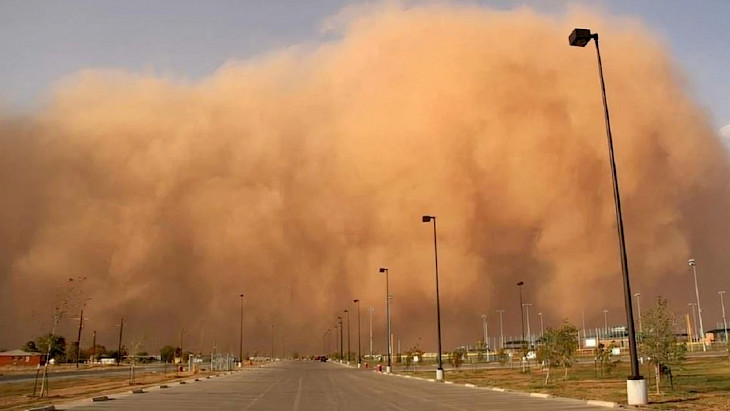
Every two and a half days, the residents of the republic found themselves in the grip of dusty weather
Samarkand
Over the past thirty years, the number of sand and dust storms worldwide, including in Tajikistan, has increased more than tenfold.
In Tajikistan, meteorologists have observed that storms and haze have persisted for the last four months of 2023. Almost every two and a half days, the residents of the republic found themselves in the grip of dusty weather, Asiaplustj.info reports.
This week in Samarkand, the problems of sand and dust storms (SDS) were discussed at the session of the Committee for the Implementation of the United Nations Convention to Combat Desertification (UNCCD).
According to UNCCD experts, approximately 2 billion tons of sand and dust enter the atmosphere annually, which, in terms of mass, is roughly equivalent to 350 pyramids of Giza in Egypt. About 25% of such storms worldwide are somehow linked to human activity.
A representative of the Uzbek Hydrometeorological Center, Bakhriddin Nishonov, stated that “according to research, Central Asia and China rank second globally (after the Sahara Desert) in dust emissions into the atmosphere – about 20% of the total.”
In Tajikistan, sandstorms invade from Afghanistan and the Aralkum Desert – dusty storms from the dried-up Aral Sea bottom have reached the upper reaches of the Zeravshan River, which was not observed before.
According to the Committee for Environmental Protection of Tajikistan, in the early 90s of the last century, there were 2-3 sand and dust storms annually with mandatory rainfall. In recent years, more than 35 sand and dust storms are registered annually without precipitation.
The National Hydrometeorology Agency of Tajikistan recorded 49 days with dust storms or persistent haze in the country over the last 4 months of this year.
Tajikistan has almost no major sources of dust storms, but they invade from other countries. Therefore, Tajikistan considers coordination and experience exchange in the SDS management and prevention system with regional countries beneficial.
According to experts, combating dust storms requires the restoration of vegetation cover and improving the management of land and water resources in regions vulnerable to sandstorms.
In Tajikistan, significant attention is given to greening and expanding the area of forests, contributing to environmental improvement. For these purposes, Tajikistan has increased the total area of specially protected green areas to 22% of the country’s total area for the sustainable preservation of ecosystems.
_______________